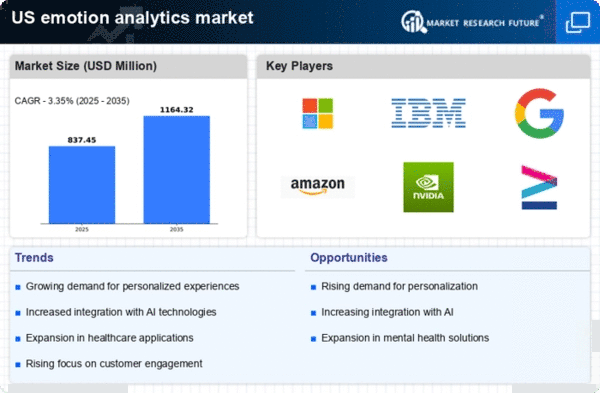Growing Importance of Brand Loyalty
Brand loyalty is becoming increasingly crucial in the emotion analytics market. As consumers are bombarded with choices, understanding the emotional drivers behind brand loyalty can provide companies with a strategic edge. Research indicates that emotionally connected customers are 2.5 times more likely to remain loyal to a brand. This realization is prompting businesses to invest in emotion analytics to gauge customer sentiments and preferences. By analyzing emotional responses, companies can tailor their marketing strategies to foster deeper connections with their audience. In 2025, the market for brand loyalty programs is expected to grow by 20%, further underscoring the need for effective emotional engagement strategies. Thus, the emotion analytics market is poised for growth as organizations prioritize emotional connections to enhance brand loyalty.
Increased Focus on Employee Well-being
The growing recognition of employee well-being is driving demand in the emotion analytics market. Organizations are increasingly aware that understanding employee emotions can lead to improved workplace culture and productivity. In 2025, companies that prioritize employee engagement are projected to outperform their competitors by 147%. This trend is prompting businesses to adopt emotion analytics tools to assess employee sentiments and address potential issues proactively. By leveraging these insights, organizations can create a more supportive work environment, ultimately enhancing employee satisfaction and retention. As the focus on mental health and well-being continues to rise, the emotion analytics market is likely to expand, providing organizations with the tools necessary to foster a positive workplace culture.
Emergence of Real-time Analytics Solutions
The emergence of real-time analytics solutions is reshaping the landscape of the emotion analytics market. Businesses are increasingly seeking immediate insights into consumer emotions to respond swiftly to market dynamics. In 2025, the demand for real-time analytics is expected to grow by 30%, reflecting a shift towards more agile decision-making processes. This trend is particularly relevant in industries such as marketing and customer service, where timely emotional insights can enhance customer interactions. By utilizing real-time emotion analytics, companies can adapt their strategies on-the-fly, ensuring they remain relevant and responsive to consumer needs. Consequently, the emotion analytics market is likely to experience significant growth as organizations embrace real-time solutions to enhance their emotional engagement efforts.
Advancements in Data Processing Technologies
Technological advancements in data processing are significantly impacting the emotion analytics market. The emergence of sophisticated algorithms and machine learning techniques allows for more accurate analysis of emotional data. In 2025, the market for data analytics tools is projected to reach $274 billion, indicating a robust demand for innovative solutions. These advancements enable businesses to process vast amounts of unstructured data, such as social media interactions and customer feedback, to derive meaningful insights into consumer emotions. As organizations increasingly rely on data-driven decision-making, the ability to harness emotional insights becomes a competitive advantage. This trend suggests that the emotion analytics market will continue to expand as companies seek to leverage advanced data processing technologies to enhance their understanding of customer sentiments.
Rising Demand for Customer Experience Solutions
The increasing emphasis on enhancing customer experience is a pivotal driver for the emotion analytics market. Businesses across various sectors are recognizing the need to understand consumer emotions to tailor their services effectively. In 2025, it is estimated that companies investing in customer experience initiatives could see a return on investment of up to 300%. This trend is particularly pronounced in retail and e-commerce, where emotional engagement can significantly influence purchasing decisions. As organizations strive to differentiate themselves in a competitive landscape, the integration of emotion analytics tools becomes essential. These tools enable businesses to capture and analyze emotional responses, thereby facilitating more personalized interactions. Consequently, the emotion analytics market is expected to grow as companies focus on emotional intelligence in customer engagement..
















